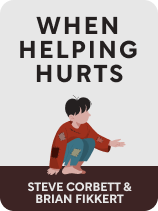

This article is an excerpt from the Shortform book guide to "When Helping Hurts" by Steve Corbett and Brian Fikkert. Shortform has the world's best summaries and analyses of books you should be reading.
Like this article? Sign up for a free trial here.
What are some When Helping Hurts quotes? How can these quotes help you understand the book’s message?
When Helping Hurts encourages Christians to take an honest look at the way they approach poverty alleviation to determine whether their efforts are causing more harm than good. The authors explain how poverty relief efforts can reinforce the recipients’ sense of powerlessness.
Let’s look at a few quotes from the book.
When Helping Hurts: Quotes With Explanations
Since the 1980s, short-term mission trips have become a popular form of ministry for many evangelical Christian churches throughout North America. The purpose of these missions is ostensibly to spread the gospel and help the poor, particularly in developing nations. But Christian economic development experts Steve Corbett and Brian Fikkert express concern that many of these missions actually do more harm than good because the people who organize them misunderstand the true nature and causes of poverty.
Here are the most important When Helping Hurts quotes that highlight the authors’ argument.
“Until we embrace our mutual brokenness, our work with low-income people is likely to do more harm than good. I sometimes unintentionally reduce poor people to objects that I use to fulfill my own need to accomplish something. I am not okay, and you are not okay. But Jesus can fix us both.”
According to Corbett and Fikkert, when people fail to understand the psychological nature of poverty and its spiritual roots, it makes their poverty alleviation efforts counterproductive. This is because, if we assume poverty is just a lack of material resources, the obvious solution to poverty seems to be to give poor people more resources. But stepping in and giving people things they can’t get for themselves or doing things for them that they can’t do for themselves highlights and reinforces their sense of powerlessness, actually making their poverty worse.
The authors also warn that all too often, when we take this approach of giving things to people or doing things for them, we do it with an attitude of superiority: We think we can save them from poverty by taking charge of their lives, telling them what to do, and doing it for them when they don’t immediately comply. We may not intend to make them feel inferior, but our sense of superiority comes across in our actions. Again, this tends to reinforce their sense of shame and powerlessness.
“While poor people mention having a lack of material things, they tend to describe their condition in far more psychological and social terms than our North American audiences. Poor people typically talk in terms of shame, inferiority, powerlessness, humiliation, fear, hopelessness, depression, social isolation, and voicelessness. North American audiences tend to emphasize a lack of material things such as food, money, clean water, medicine, housing, etc.”
Corbett and Fikkert trace the root cause of poverty even deeper, arguing that the psychological state of poverty is caused by the broken relationships that resulted from the Fall of Man, as recorded in the Bible. They argue that when the first humans fell into sin, it damaged their relationships with God, each other, the rest of creation, and even with themselves.
When these relationships were broken, people were no longer able to fulfill their God-given role as masters of God’s creation, managing earth’s resources in a way that would allow them to support themselves, benefit society, and glorify God. Because we fail to live up to the role that we were created for, we experience the psychological state of poverty: feelings of shame and powerlessness.
Corbett and Fikkert note that since everyone suffers the effects of the Fall, everyone is “poor” in a spiritual sense. Nevertheless, they stress that material poverty is particularly difficult to get out of because of a vicious cycle.
“If we treat only the symptoms or if we misdiagnose the underlying problem, we will not improve their situation, and we might actually make their lives worse.”
Corbett and Fikkert advise that it’s important to consider which of the three types of aid the community you’re trying to help needs and to provide the right type of aid. They observe that many churches default to providing relief, but most poor people need development, not relief.
At any given time, only a small percentage of the poor people in the world need immediate relief: victims of recent natural disasters, for example. Even in the case of a natural disaster, the authors observe that by the time a church has heard about the disaster on the news, planned a charitable mission to help the victims, raised funding to support the mission, and sent a missionary team to the affected area, the need for relief is typically over. By that time the victims need rehabilitation or development.
As we discussed above, giving things to poor people or doing things for them can make their psychological poverty worse, but giving people things to meet their immediate needs is an integral component of relief. As such, the authors emphasize that you should provide relief sparingly and only as an immediate response to a real crisis.

———End of Preview———
Like what you just read? Read the rest of the world's best book summary and analysis of Steve Corbett and Brian Fikkert's "When Helping Hurts" at Shortform.
Here's what you'll find in our full When Helping Hurts summary:
- How many Christian church missions actually do more harm than good
- A look into the true nature and causes of poverty
- Suggestions for how to help the poor more effectively






